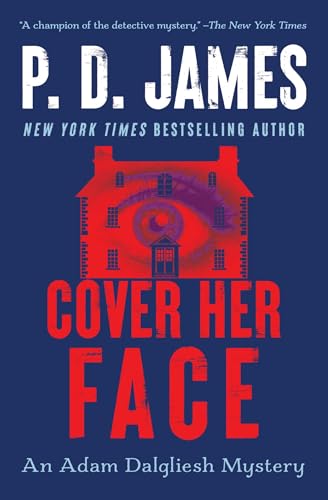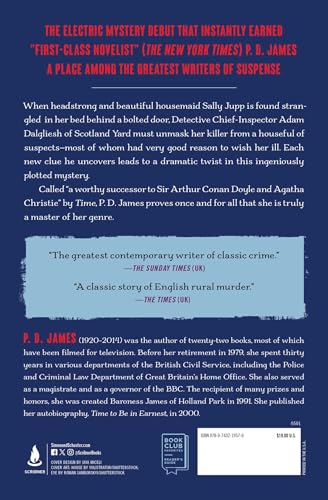Alright, let’s get the kettle on because things are about to get murderously British. Here’s my review of one of PD James’s whodunnits, a book that takes you right into the heart of an English village packed with secrets, fog, and people who say ‘good morning’ but mean ‘I know what you did.’ I’ll chat about the crafty plots, the moody setting, Adam Dalgliesh (the kind of detective you’d awkwardly bump into at a poetry reading), and the writing itself. I promise to spill both the good and not-so-good beans—someone has to warn you when the pacing threatens your bedtime. Let’s crack on!
PD James: Queen of British Crime
In a nutsheel
PD James, the grand wizard of British mystery, gives us a top-notch whodunit with this book. It’s classic crime fiction: think murder, small English towns, awkward tea parties, and a brooding detective who’s smarter than everyone else but never rubs it in (well, not much).
The book follows a layered murder mystery where secrets hide in plain sight and nobody’s telling the whole truth. Themes of justice, grief, and that classic British sense of order and chaos run through the story. PD James isn’t afraid to get into the weeds with her characters, making them feel too real at times—like you could catch them lurking in your own local shop.
If you like slow-burn mysteries and sharp writing, you will enjoy this one. You might want to keep the lights on, just in case.
Murder, Mazes, and Mayhem: Plot Twists and Pacing in P.D. James Mysteries
If you like getting lost (not literally, unless you got a very strange GPS) in a murder mystery, P.D. James delivers twists tighter than my jeans after Thanksgiving. Her books, like Shroud for a Nightingale and An Unsuitable Job for a Woman, are packed with puzzles that keep your mind running faster than you do when someone shouts ‘free cake!’
The pacing in James’s novels is like a British train: slow to start, but once it picks up, you better pay attention or you’ll miss your stop. Honestly, I’ve had to re-read a few chapters because I blinked and a new suspect had popped up, wearing a different hat and holding a mysterious letter. The way she peels back layers of the plot reminds me of my last attempt at making lasagna—messy, surprising, and very satisfying (though nobody died in my kitchen, thankfully).
But I’ll be honest, sometimes the pace can stall. A few chapters in, things might get a bit chatty, with people talking about inheritance and backstories while I’m just waiting for the next body to turn up. Still, the twists make up for it. Just when you think you’ve got it figured out, BAM! someone else bites the dust, and you have to start guessing all over again.
Now, if you’re ready to meet a detective with more layers than my Aunt Mabel’s onion dip, let’s move on to the next section—Character depth, especially Adam Dalgliesh!
Peeling Back the Layers: The Depth of Adam Dalgliesh and PD James’s Characters
If you like detectives who are more than just a hat and a notebook, then Adam Dalgliesh will be your new crush. PD James doesn’t just hand us a sleuth with a badge, she serves up a whole main course full of quirks, soul, and, let’s be honest, a pinch of sadness. Dalgliesh is not just a guy who solves murders—he’s also a poet, and that’s probably why he spends a lot of time thinking instead of, you know, actually catching bad guys faster. Sometimes I wish he’d stop writing poems and chase the villain, but it does make him interesting.
When I read my first PD James with my book club—shoutout to my friend Marcy who brings those dry cookies—I was surprised by how real Dalgliesh felt. He’s not a superhero. He has suffered losses and sometimes seems about as happy as a rainy Monday. But he’s clever and deeply moral, and gosh, does he love a puzzle. It’s not just Dalgliesh. PD James gives side characters a lot of love too. The suspects have backgrounds, motives, and more secrets than my Aunt Linda’s lasagna recipe. This made our book club pause a few times, just to talk about who we liked, who we didn’t trust, and who needed a hug.
But here’s my one complaint: sometimes, the deep dives into feelings slow down the action. If you’re the type who likes everything fast—like microwave pizza—these moments might try your patience. Still, you’ll find yourself caring about everyone, not just the detective.
Next up, I’ll take you straight into the foggy corners and creaky cottages of a 1960s English village—so grab your umbrella and rubber boots!
The Atmosphere of a 1960s English Village in PD James Mysteries
If you ever wanted to visit a proper English village, but also secretly wish you might stumble across a good old murder (for entertainment, of course!), PD James is your guide. Her books whisk you into the 1960s countryside, where the grass always seems a bit damp and you can’t escape the sound of a kettle whistling. James paints these villages so well, you can almost smell the toast burning in the vicarage.
In a PD James story, the village isn’t just somewhere to park your rain boots, it’s almost a character itself. There’s the local pub, which somehow knows everyone’s secrets. The tiny post office, where gossip travels faster than mail. And all those twisting lanes—if you’re not careful, you’ll end up at the wrong manor house at midnight. For us city folk, it feels a bit like stepping into another world, one where everybody knows everybody, but no one says a word when the vicar’s cat goes missing.
The 1960s settings add an extra flavor. There are no cell phones, and police have to actually walk up to your door to question you. Suspense builds with the help of a bad phone line and a car that sometimes just won’t start. PD James nails the mood, with fog rolling in just when things get spooky, and the village green hiding more secrets than the annual bake sale. It’s so vivid, I half expected someone to offer me tea while I read, though my dog looked at me funny when I asked.
Next up, let’s see if PD James’s conversations are as tasty as her village atmospheres. Stay tuned for the chatter!
Quality of Writing and Dialogue: PD James Nails the Details
If you want fancy writing but also want to understand what’s happening, PD James is your pal. Her writing is crisp and clear, like a good British biscuit. She doesn’t sprinkle words like confetti—she chooses each one with care. I felt like I was eavesdropping on very smart, sometimes grumpy, British people having real conversations. Nobody suddenly talks in riddles or says, ‘It was the butler!’ with a dramatic cape swirl. The characters argue, joke, and even mumble just like normal people, but it’s all somehow still interesting. I once tried to imitate a Dalgliesh conversation at a party, but people just offered me more cheese and told me to go easy on the red wine.
Still, sometimes the dialogue can go on a little longer than your grandma’s tales about her cats. There were points where I whispered, ‘Alright, let’s move along,’ but then another clever remark would make me laugh, so I forgave her quickly. There’s a nice balance between witty banter and the serious talk of catching murderers, so you don’t feel like you’re trapped in a philosophy lecture or a standup show. PD James clearly paid attention to how people actually talk, which makes everything feel real.
If you want to read a book where the writing is smooth and the dialogue is sharp as cheddar, I say go for it. You won’t need a dictionary, just a comfy chair and maybe a biscuit or two.
Conclusion
Alright folks, that’s my review of PD James! If you like mysteries with twisty plots, strong English village vibes, and detectives who actually have feelings, PD James is your jam. The pacing can be slow—like standing in a long line at the bakery—but the pay off is worth it. Dialogue is smart, though sometimes a bit wordy. She nails atmosphere and characters better than my grandma bakes pies. If you’re looking for a clever whodunnit, give her books a go, but maybe keep some coffee nearby for the slower bits. That’s it for this review—remember, there’s no shame in enjoying a snoop through the foggy English countryside!



